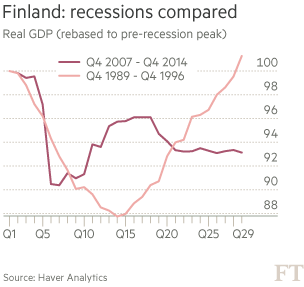The euro closer to parity with dollar, stress tests and venture capital

Stay up to date:
United States
The daily briefing “FirstFT” from the Financial Times.
The euro continued its slide towards parity with the dollar ahead of next week’s Federal Reserve meeting at which it is expected to lay the groundwork for a rate rise as early as June. It’s not all good news: the stronger dollar has squeezed exporters’ earnings and could trigger disinflation through cheaper imports. (FT)
As the Federal Reserve prepares to tighten, the march of central banks in the opposite direction continues apace. South Korea became the latest central bank to loosen monetary policy, following in the footsteps of China, India and Thailand and taking the year-to-date tally of rate cuts to 22. (FT)
In Europe, chief executives have started predicting better times ahead on the back of a lower euro. A nearly $0.2 move in the euro against the dollar is worth about 5 per cent in operating profit to European corporates. (FT)
In the news
Alexei Navalny calls for blacklist In an interview with the FT, the Russian opposition leader called on the west to impose travel bans, and freeze assets of oligarchs and officials loyal to Putin, including Roman Abramovich, the owner of Chelsea football club. Navalny struck a pessimistic tone after the death of Boris Nemtsov. “A few years ago, we thought this was just nepotism, but now we realise that this is long-term planning: he [Putin] is installing dynastic rule“. (FT)
Alibaba invests in Snapchat The Chinese ecommerce group invested $200m in the social app, valuing it at $15bn. One person familiar with the deal said the investment was purely financial rather than anything strategic. (FT)
Deutsche and Santander fail stress tests The Federal Reserve found the US operations of Deutsche Bank and Santander to have serious deficiencies in capital planning and risk management. Here’s how the banks performed in the tests and how they tried to reassure investors afterward. (FT)
Greece demands reparations Cash-strapped Greece is trying a new line – or rather an 70 year old one – with its European creditors. Prime Minister Alexis Tsipras claims Athens is owed EUR160bn in compensation for a forced loan to Nazi occupiers and destruction of the country’s assets during the second world war. (FT)
Ferguson police chief quits Tom Jackson resigned a week after a US justice department report found that the city routinely violates the constitutional rights of African Americans. The report will be used to reach a settlement with the police department, which faces a lawsuit if it fails to make sweeping changes. (FT)
It’s a big day for
Morrison The supermarket chain reports annual pre-tax profit which is expected to have halved as a result of its £1bn price war designed to fend off competition with discounters Aldi and Lidl. (FT)
Europe’s counter terrorism efforts Security officials will propose a terror-fighting unit focused on monitoring extremist content online. Meanwhile Isis has desecrated Khorsabad, another ancient Iraqi capital. (FT, Reuters)
Food for thought
The market for abducted babies Each year, anywhere between 20,000 and 200,000 children are abducted in China and many of them are being sold openly online. They are most often sold for adoption but some are forced to work as beggars for criminal gangs. A baby boy fetches up to $16,000 – twice as much as a girl. (BBC)
The need for a happy family in venture capital An enduring partnership is valuable in venture capital, says John Gapper – and not just as marketing. It often takes 10 to 15 years for early stage investments to reach maturity so the capacity to bequeath a firm’s knowledge and brand value is highly valuable. (FT)
The saga continues In the second part of his road-trip across North America, Karl Ove Knausgaard meets members of his family, tears up at the sudden beauty of a lake and ruminates over how he has struggled to master human communication. (NYT$)
Citizenship shopping Swiss lawyer Christian Kalin pioneered a citizenship for investment programme in St Kitts that is now being used by other small states to lure investors. Of course, the practice has its critics and even Kalin himself admits that, “All of the programs have a certain tendency for corruption, unfortunately”. (Bloomberg)
Northern blight The hardship felt by many in Finland, which has been mired in recession for the past three years, upends the notion of the eurozone crisis being just about free-spending southern Europeans. (FT)
Born to die Ranchers in South Africa are breeding animals of unusual colour, from white lions with blue eyes to golden wildebeest, for the sole purpose of being shot. Flaxen creatures are “the latest craze in South Africa’s $1bn ultra-high-end big-game hunting industry.” (Bloomberg)
Video of the day
The Litvinenko case Leading physicist Professor Norman Dombey explains to FT eastern Europe editor Neil Buckley why he thinks the polonium used to kill Russian spy Alexander Litvinenko could only have been produced in a plant in Russia.
This article is published in collaboration with The Financial Times. Publication does not imply endorsement of views by the World Economic Forum.
To keep up with the Agenda subscribe to our weekly newsletter.
Author:
Image: Newly introduced 10 Euro banknotes are pictured under ultraviolet light during a news conference. REUTERS/Ralph Orlowski.
Don't miss any update on this topic
Create a free account and access your personalized content collection with our latest publications and analyses.
License and Republishing
World Economic Forum articles may be republished in accordance with the Creative Commons Attribution-NonCommercial-NoDerivatives 4.0 International Public License, and in accordance with our Terms of Use.
The views expressed in this article are those of the author alone and not the World Economic Forum.
Related topics:
Forum Stories newsletter
Bringing you weekly curated insights and analysis on the global issues that matter.
More on Geo-Economics and PoliticsSee all
Ella Yutong Lin
June 19, 2025
Spencer Feingold
June 10, 2025



